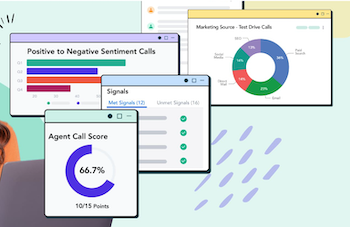 Large Language Models (LLMs) and Generative AI (GenAI) are the center of attention in the customer experience (CX) and Contact Center communities…perhaps to a fault. High expectations, matched with misinformation and competing claims from a broad spectrum of vendors have transformed prospective implementers into the proverbial deer in the headlights. Everybody feels like they ought to be doing something with “conversational AI” but they proceed with extreme caution, lest they fall victim to “hallucinations” or find themselves investing in hiring and training computer scientists that can curate aggregated content, craft effective prompts or monitor a model’s output to ensure accuracy and veracity.
Large Language Models (LLMs) and Generative AI (GenAI) are the center of attention in the customer experience (CX) and Contact Center communities…perhaps to a fault. High expectations, matched with misinformation and competing claims from a broad spectrum of vendors have transformed prospective implementers into the proverbial deer in the headlights. Everybody feels like they ought to be doing something with “conversational AI” but they proceed with extreme caution, lest they fall victim to “hallucinations” or find themselves investing in hiring and training computer scientists that can curate aggregated content, craft effective prompts or monitor a model’s output to ensure accuracy and veracity.
To counter confusion and promote efficiency, Invoca has launched a GenAI-infused extension to Signal Discovery and the entire Signal AI suite. Called Signal AI Studio, it gives sales professionals, not prompt engineers, the tools to create their own AI models designed specifically to accelerate sales; no code required. Invoca calls the process “co-creation” of custom models. They can be designed to detect lead intent, product or service interest, and conversion outcome based on the content of every call or interaction from search and digital marketing. Employing these custom LLMs and GenAI, Signal AI Studio can measure and display the performance of individual promotional campaigns, tackle the challenges of increasing Return on Ad Spend (ROAS) as well as revenue, and help with targeting the right callers with the right message at the right time.
Doing Bayesian One Better
If the characteristics of the new Signal AI Studio sound a lot like the original Signal Discovery, that’s because it is direct extension of that venerable product. Signal Discovery worked its magic using probabilistic (Bayesian) models to evaluating every call at the macro level and extract common themes and topics. That is not a strong suit of LLMs and GenAI, which have demonstrated their power to summarize a single conversation, anecdotally recommend next-best actions for an agent on a single call, support relatively simple Q&A and, most conspicuously, render human-like answers to customer or agent inquiries. Marrying Bayesian models with GenAI enables Invoca’s solution to create a topic vector for every call and then apply it to the tens of thousands of calls. More importantly, it allows for “semantic search” of all the calls dealing with a particular topic with the ability to hone in on the relevant part of each call.
Sales people and supervisors, who are always pressed for time, are able to get answers to questions that they pose in their own words. Invoca calls it “the fastest path to building custom AI models.” The company-specific language models are trained on each business’s actual calls, which makes them extremely accurate and topical. The tool is very much like a search engine. Users need only type in the insight they seek to analyze at scale. For instance, they can ask if an agent has successfully booked an appointment, if they gave a proper greeting, or if they are receiving a high value service call. When Signal AI Studio returns an answer, it also shows specific moments from relevant calls to review and, with a few clicks, creates an algorithm to classify similar conversations in the future. It also transcribes examples from previous calls it believes fits that insight, and the user can confirm if the AI’s suggestion is correct.
As Easy as Search
Signal AI Studio is a well-timed offering. It has been almost a year since OpenAI unleashed ChatGPT on the unsuspecting world. In doing so, it provided a conversational user interface to LLMs and GenAI that is now available through browsers, search engines and mobile apps. It has made Conversational AI ubiquitous and has also made the general public comfortable entering queries or turning to ChatGPT-like resource – like Claude, Bard, Perplexity and now Signal AI – for answers, insights and suggestions. Popularity will be compounded as the resource proves to be effective at accelerating sales and growing revenues.
Categories: Conversational Intelligence, Articles

 Beyond the Basics: How AI Is Transforming B2B Sales at TP
Beyond the Basics: How AI Is Transforming B2B Sales at TP  Five9 Launches Agentic CX: Toward AI Agents That Reason and Act
Five9 Launches Agentic CX: Toward AI Agents That Reason and Act  2025 Conversational AI Intelliview: Decision-Makers Guide to Self-Service & Enterprise Intelligent Assistants
2025 Conversational AI Intelliview: Decision-Makers Guide to Self-Service & Enterprise Intelligent Assistants  Talk to the Web: How NLWeb Opens Conversational Access to Site Content
Talk to the Web: How NLWeb Opens Conversational Access to Site Content